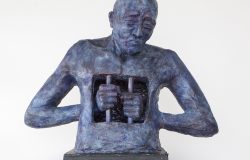In Ancient Greek mythology there is the story of Cassandra, the daughter of King Priam and Queen Hecuba of Troy. Bestowed upon her by Apollo was the gift of prophecy, and in payment for this talent, Apollo wanted the pleasure of their sexual union, which Cassandra refused. In retaliation for this rebuff, Apollo sanctioned the fine print in the contract of this prophetic gift, which was that no one would believe her prophecies. Cassandra was cursed to go through life seeing the future, casting forth warnings and being listened to by none.
In modern day psychology we have a term called the Cassandra complex. This is the syndrome when valid warnings given by those who see something different are dismissed by others. It occurs in workplaces when brave individuals want to speak up about practices that some organisations would prefer to have swept under carpets and left well alone. It happens in public life when people speak up about a celebrity or politician who has misused their power and the media throws doubt on the cogency of the victim. It happens in families where people suffering under abuse nervously speak up and others say, “they must be making that up.” Fear makes us quiet.
Margaret Heffernan uses the legal term of willful blindness to refer to our behaviour of pleading convenient ignorance. It’s something we can all adopt when we sense the fear of being the odd one out, of causing conflict or the simple fear of changing our familiar and comfortable state of being. Wealth and power are big contributors to willful blindness, but so to is the fear of being called out as a freak. Whistleblowers don’t get great press – sadly.
Speaking up when we see something that doesn’t make sense or feels wrong is shrouded in fear because shame closely guards all secrecy. Conforming to the status quo can feel better because our brains like to feel loved and loveable. Sometimes being the one that disagrees or sees it differently has the danger of ostracism attached to it. Shame has a really powerful hold over people.
The root meaning of shame is ‘to cover’ and typically when we are made to feel the humiliating pain of being unworthy we cover our face or body or entire being from others. When others cause us to feel ashamed they expose something about us: we are uncovered as nakedly unworthy. All sees our shame.
Nathaniel Hawthorne introduced us to Hester Prynne who was led from the town prison with the scarlet letter “A” emblazoned on her breast, distinguishing her as an adulterer. The Puritans were big on the badge of shame, sometimes choosing branding on the cheek or forehead so the sin was forever visible. The community could mutter its disapproval, making themselves more righteous by virtue of their non-branded faces. Thus conformity is bred.
In the Middle Ages European Jews were required to wear a yellow badge that was reinstated in Nazi Germany along with the pink triangle for homosexuals to discriminate difference. The badge of the poor in the 1600’s allowed the wearer to beg and be excused of debts. There’s the dunce cap for humiliating slow or mischievous children, the separation of lepers, the shaving of heads for those who fraternize with the enemy in times of war and the striped or orange uniform of criminals, which are all symbols used to categorize people and make their nonfeasance known to all in the future. These distinguishing symbols say ‘look at them, they are different!’
Something quite extraordinary takes place when we are made to feel shame. The doyenne of shame, Brené Brown, tells us that there is distinction between guilt and shame. When we feel guilt it is because what we have done is bad and so we feel guilty about doing it. Whereas when we are made to feel ashamed, we take on the idea that ‘I am bad’. It’s a very personal and paralyzing attack on our identity.
To a large extent we are all a creation of the society in which we are raised and live. To that end, we are constructing a sense of who we are in the world by the story we have running in our minds about how good or bad we are. We are shaped by our world around us and in turn shape the world. Not many of us are fans of thinking that we are bad, unworthy or painfully different. Our desire to blend in and be accepted makes for an intricate dance into personhood.
We are in a constant state of becoming as we construct our identities from our experience of life. When we are small and our school mates mock our freckles, or glasses, or lack of ball skills we begin to realise that the boon of familial support might not work the same in a world where we must endure judgment and distinction in to or out of a preferred sect. So we go to work hiding bits of this, concealing some of that and ignoring parts of ourselves we suspect as being unlovable.
As we get older and move through life we will meet people who are adept at using the fear of shame to their advantage. When people have power they are very good at learning ways to keep their privileges in tact. They will control conversations about us that form our identity. Just as the mean kid at school could tell others that our height, hair colour or demeanour was not right, people with power can make decisions about who we are that ensures we remain powerless or at least that we are excluded from the ‘right’ crowd.
Weakness feeds shame mongers. They’ll use shaming strategies like a mustard gas; manipulating their privileged compatriots into believing the ones not like them are dangerous, evil, ungodly and certainly not to be trusted or liked. Their artillery of denunciation is inexhaustible. They can target a victim with exact precision and can rally a following with charismatic allure to bring you down, choking under the fumes of your unlovable odour.
Standing up to shame mongers is not for the meek. However, we make ourselves powerless when we pretend we don’t know. Manufacturing ‘friendly alibis’ for our own inertia and to disguise our fear of being distinguishable from others happens almost without thought. Our internal navigation system knows when something is not quite right with how we are leading our lives and who we are letting ourselves become. We have an inner Cassandra who can foresee the truth of our becoming and it knows when we won’t face into something because of the fear of shame.
The antidote for shame is empathy. Having compassion for the human condition is the only way to accept the foibles of being alive. Every relationship we have cries out for the acceptance of our imperfections and the ones we love most are those that accept us with our limitations and oddities. This welcomed connection says we don’t have to suffer alone. It’s a brave and wonderful journey living life and none of us has got the the map through this adventure sorted out no matter what momentary power or notoriety we may have. I suspect at the end of our days if we can say we loved ourselves and had compassion for who we became there will be no shame on us.







What an exquisite piece of writing… Thank you for sharing it with the world!
Thank you